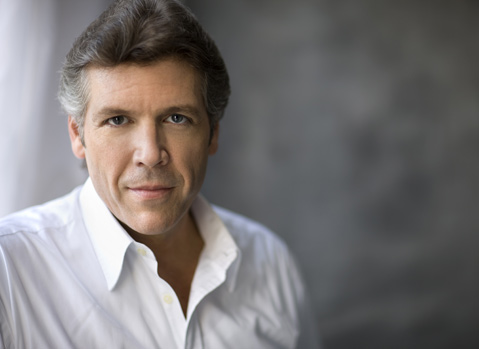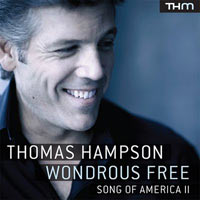Thomas Hampson Sings at UCSB
The Country's Foremost Baritone Explores History of American Song

The expanded cultural role of the virtuoso performer as intellectual has no finer avatar in the 21st century than baritone Thomas Hampson. With a voice and stage presence that could keep him working continuously in the world’s finest opera companies, Hampson insists on doing much more, as a recitalist, as an educator, and above all as a scholar/philosopher of song in its most exalted aesthetic manifestations. On Friday, October 9, Hampson will appear at UCSB’s Campbell Hall in a recital of material drawn from his Song of America project, a multi-faceted scholarly collaboration with the Library of Congress that began in 2005-6. Song of America gives Hampson a structure through which to articulate his vivid, comprehensive, and lofty personal understanding of American culture. This season of the project commemorates the 250th anniversary of the first song written by an American, “My Days Have Been So Wondrous Free” (1759), by Francis Hopkinson, a signer of the Declaration of Independence. Wondrous Free also serves as the title to Hampson’s most recent CD, the second volume in a series of recordings of historically significant American art songs.

Schooled in the Romanticism of the great European song cycles, Hampson cherishes the Romantic/Transcendental strain in American culture, and employs Walt Whitman and Ralph Waldo Emerson as the guiding spirits in his ongoing quest to discover the American soul through song. Hampson refers to the intellectual continuity between European Romanticism and the idea of American democracy as “the bedrock” of his participation in the Song of America project. Using specific songs as prisms through which to view the various periods of American history, Hampson discovers what Romanticism meant at that time. He describes the American art song tradition as “rooted in European Romanticism, but emboldened by the Declaration of Independence.” “Here,” he says, “the dialogue was more about folk roots and form than about individual sovereignty in a philosophical sense. : We took from Emerson the impulse to let inspiration dictate form,” he goes on to say, “but we have nevertheless remained in a healthy dialogue [with European art] ever since.”
In the winter of 2009-10, Hampson will be Artist in Residence at the New York Philharmonic, performing in concerts and recitals and giving master classes and lectures in a series titled “Listening to Thought.” Despite the passion of his commitment to music and ideas, the singer remains remarkably candid about the self-perceived limits of his expertise, saying, “It’s very important to me to state that I have no ambition to define what an American song is. The area of my expertise is poetry set to music, and this project is not really about popular music or jazz.”
The music itself, as heard on Wondrous Free, is gorgeous, dark, deep, and loaded with emotion. Hampson is particularly effective in evoking the fundamental solitude of American selfhood. If anyone can sing the nation back into a sense of the sublime as heralded by Emerson and Whitman, it is Thomas Hampson.
And what does this new American Adam like to do when he’s not contemplating the canon of American literature, traveling, or singing? Well, here’s what he said about our city: “Santa Barbara has some of the best golf courses I know. The Valley Club course in Montecito is my idea of God’s green earth.”
4•1•1
Thomas Hampson will appear at UCSB’s Campbell Hall on Friday, October 9, at 8 p.m. For tickets and information, visit artsandlectures.sa.ucsb.edu or call 893-3535.



